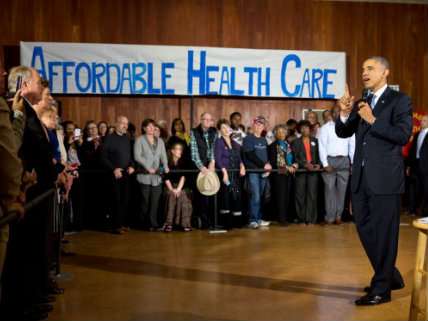The White House's Contingency Plan if it Loses on Obamacare at the Supreme Court: Blame Republicans

The White House has long insisted that it has no contingency plans in place should the Supreme Court rule against the administration in King v. Burwell, a case that challenges the legality of Obamacare's subsidies in the 36 states that opted not to create their own health insurance exchanges under the law.
Even now, with a decision looming, President Obama maintains that there is no ready plan should the High Court side with the challengers.
Responding to press questions yesterday, Obama brushed off a question about whether the administration had a "plan B" in place, and instead argued that the Supreme Court shouldn't have taken up the case at all, that it was an easy to case to decide in the administration's favor even using conservative judicial thinking, and that, should the Court rule the federal exchange subsidies off limits, Congress "could fix this whole thing with a one-sentence provision."
It was a short preview of the administration's likely response in the event of an adverse ruling: Blame the Supreme Court for giving a platform to the challengers, argue that the ruling is hopelessly politicized, and then throw the problem back to the GOP-controlled Congress by demanding that it rewritethe health law in a way that gives the administration the very same authority that the High Court had just ruled beyond the bounds of the law.
In some sense, this is the contingency plan: to win the ensuing political fight by laying both blame and responsibility at the hands of others—mostly congressional Republicans.
It's a predictable enough move, but even still, a notably brazen one: Democrats, under President Obama, were entirely responsible for crafting the bill, for passing it, and for implementing it at the federal level. Any conflicts between how the law was written and how it was implemented are the fault of those who wrote and implemented it, not those who opposed the law and its creation. Blaming Republicans for Obamacare's problems is a little like blaming Pepsi for the failure of New Coke.
But Obama's response is not merely about shifting the blame. It's also about avoiding larger, tougher questions about the health law amongst the public.
President Obama and his fellow Democrats understand that a ruling against the administration would open the door to major changes in Obamacare, providing an opportunity to significantly overhaul the law or perhaps even repeal it entirely.
Democrats have been emboldened by recent polls suggesting that the public would prefer the Supreme Court not block Obamacare's federal exchange subsidies. But on the larger question of the law's existence, the public's opinion isn't so favorable. Just over 50 percent of the public continues to oppose the law, according to the RealClearPolitics poll average. As has long been the case with Obamacare, a specific benefit like the subsidies polls well, but the larger law, with its costs and tradeoffs, does not.
President Obama's remarks were designed to call attention to the fact that an adverse ruling from the Supreme Court would put Obamacare's subsidies in doubt. But what he doesn't want to acknowledge is that it would put the status of the entire law into question. Because doing so might run the risk of reminding people that there is a different sort of one-sentence "fix" available: This law is repealed, in its entirety.


Show Comments (155)